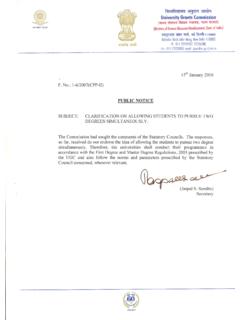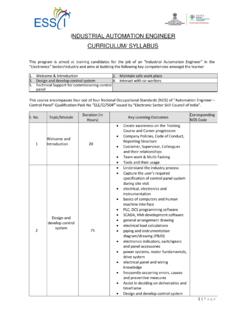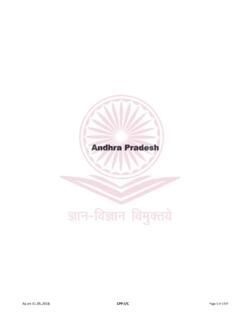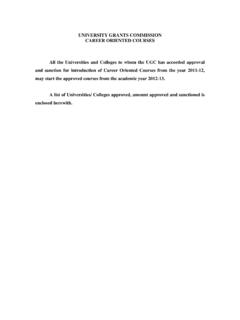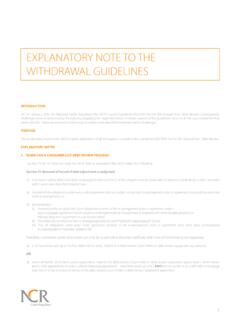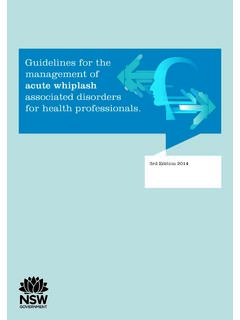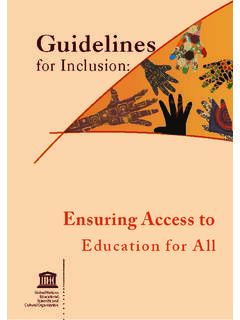Transcription of Guidelines for MINIMUM COURSE CURRICULUM FOR …
1 1 MINIMUM COURSE CURRICULUM FOR UNDERGRADUATE COURSES UNDER CHOICE BASED CREDIT SYSTEM 2 MINIMUM COURSE CURRICULUM FOR UNDERGRADUATE COURSES UNDER CHOICE BASED CREDIT SYSTEM Background/Preamble: Ministry of Human Resource Development (HRD), Govt. of India, has already initiated the process for developing New Education Policy (NEP) in our country to bring out reforms in Indian education system. University Grants Commission (UGC) participates more actively in developing national Education Policy, its execution and promotion of higher education in our country. The UGC has already initiated several steps to bring equity, efficiency and academic excellence in national Higher Education System. The important ones include innovation and improvement in COURSE - curricula, introduction of paradigm shift in learning and teaching pedagogy, examination and education system.
2 The education plays enormously significant role in building of a nation. There are quite a large number of educational institutions, engaged in imparting education in our country. Majority of them have entered recently into semester system to match with international educational pattern. However, our present education system produces young minds lacking knowledge, confidence, values and skills. It could be because of complete lack of relationship between education, employment and skill development in conventional education system. The present alarming situation necessitates transformation and/or redesigning of education system, not only by introducing innovations but developing learner-centric approach in the entire education delivery mechanism and globally followed evaluation system as well. Majority of Indian higher education institutions have been following marks or percentage based evaluation system, which obstructs the flexibility for the students to study the subjects/courses of their choice and their mobility to different institutions.
3 There is need to allow the flexibility in education system, so that students depending upon their interests and aims can choose inter-disciplinary, intra-disciplinary and skill-based courses. This can only be possible when choice based credit system (CBCS), an internationally acknowledged system, is adopted. The choice based credit system not only offers opportunities and avenues to learn core subjects but also exploring additional avenues of learning beyond the core subjects for holistic development of an individual. The CBCS will undoubtedly facilitate us bench mark our courses with best international academic practices. The CBCS has more advantages than disadvantages. Advantages of the choice based credit system: Shift in focus from the teacher-centric to student-centric education. Student may undertake as many credits as they can cope with (without repeating all courses in a given semester if they fail in one/more courses).
4 CBCS allows students to choose inter-disciplinary, intra-disciplinary courses, skill oriented papers (even from other disciplines according to their learning needs, interests and aptitude) and more flexibility for students). 3 CBCS makes education broad-based and at par with global standards. One can take credits by combining unique combinations. For example, Physics with Economics, Microbiology with Chemistry or Environment Science etc. CBCS offers flexibility for students to study at different times and at different institutions to complete one COURSE (ease mobility of students). Credits earned at one institution can be transferred. Disadvantages: Difficult to estimate the exact marks Workload of teachers may fluctuate Demand good infrastructure for dissemination of education CHOICE BASED CREDIT SYSTEM (CBCS): The CBCS provides an opportunity for the students to choose courses from the prescribed courses comprising core, elective/minor or skill based courses.
5 The courses can be evaluated following the grading system, which is considered to be better than the conventional marks system. Therefore, it is necessary to introduce uniform grading system in the entire higher education in India. This will benefit the students to move across institutions within India to begin with and across countries. The uniform grading system will also enable potential employers in assessing the performance of the candidates. In order to bring uniformity in evaluation system and computation of the Cumulative Grade Point Average (CGPA) based on student s performance in examinations, the UGC has formulated the Guidelines to be followed. 4 Tentative list of Undergraduate Disciplines/Courses to be covered under CBCS developing common MINIMUM structure and syllabi: BACHELOR COURSES UNDER CBCS IN INDIA UNDERGRADUATE COURSES 1 Arts and Humanities 1.
6 Hindi 2. Sanskrit 3. Modern Indian Language- Punjabi 4. English 5. Sociology 6. Public Administration 7. Defense and Strategic studies 8. History 9. Geography 10. Economics 11. History and Tourism 12. Philosophy 13. Political Science 14. Music 15. Journalism 16. Psychology 17. Mathematics 18. Home Science 19. Education 2 Commerce and Management 20. Business Economics 21. Commerce 22. Banking and Insurance 23. Accounting and Finance 24. Financial Markets 25. Company and Compensation law26. Business Administration 27. Labor Management 28. Tourism and Travel management3 Science 29. Medical/Life Sciences 30. Chemistry 31. Physics 32. Botany 33. Zoology 34. Biotechnology 5 35. Microbiology 36. Biochemistry 37. Computer Science 38. Environmental Science 39. Food Technology 40. Electronic Science 41. Information Technology 42.
7 Forensic Science 43. Biomedical Science 44. Physical Science 45. Operational Research 46. Statistics 47. Anthropology 5 Others 48. LLB 49. BCA 50. B. Lib 51. 52. 53. Multimedia and Communication 54. Fine Arts 55. Performing Arts 56. Physical Education and Health 57. Foreign Languages 6 Outline of Choice Based Credit System: 1. Core COURSE : A COURSE , which should compulsorily be studied by a candidate as a core requirement is termed as a Core COURSE . 2. Elective COURSE : Generally a COURSE which can be chosen from a pool of courses and which may be very specific or specialized or advanced or supportive to the discipline/ subject of study or which provides an extended scope or which enables an exposure to some other discipline/subject/domain or nurtures the candidate s proficiency/skill is called an Elective COURSE .
8 Discipline Specific Elective (DSE) COURSE : Elective courses may be offered by the main discipline/subject of study is referred to as Discipline Specific Elective. The University/Institute may also offer discipline related Elective courses of interdisciplinary nature (to be offered by main discipline/subject of study). Dissertation/Project: An elective COURSE designed to acquire special/advanced knowledge, such as supplement study/support study to a project work, and a candidate studies such a COURSE on his own with an advisory support by a teacher/faculty member is called dissertation/project. Generic Elective (GE) COURSE : An elective COURSE chosen generally from an unrelated discipline/subject, with an intention to seek exposure is called a Generic Elective. : A core COURSE offered in a discipline/subject may be treated as an elective by other discipline/subject and vice versa and such electives may also be referred to as Generic Elective.
9 3. Ability Enhancement Courses (AEC): The Ability Enhancement (AE) Courses may be of two kinds: Ability Enhancement compulsory Courses (AECC) and Skill Enhancement Courses (SEC). AECC courses are the courses based upon the content that leads to Knowledge enhancement; i. Environmental Science and ii. English/MIL Communication. These are mandatory for all disciplines. SEC courses are value-based and/or skill-based and are aimed at providing hands-on-training, competencies, skills, etc. Ability Enhancement compulsory Courses (AECC): Environmental Science, English Communication/MIL Communication. Skill Enhancement Courses (SEC): These courses may be chosen from a pool of courses designed to provide value-based and/or skill-based knowledge. Introducing Research Component in Under-Graduate Courses Project work/Dissertation is considered as a special COURSE involving application of knowledge in solving / analyzing /exploring a real life situation / difficult problem.
10 A Project/Dissertation work would be of 6 credits. A Project/Dissertation work may be given in lieu of a discipline specific elective paper. 7 Implementation: 1. The CBCS may be implemented in Central/State Universities subject to the condition that all the stakeholders agree to common MINIMUM syllabi of the core papers and at least follow common MINIMUM CURRICULUM as fixed by the UGC. The allowed deviation from the syllabi being 20 % at the maximum. 2. The universities may be allowed to finally design their own syllabi for the core and elective papers subject to point no. 1. UGC may prepare a list of elective papers but the universities may further add to the list of elective papers they want to offer as per the facilities available. 3. Number of Core papers for all Universities has to be same for both UG Honors as well as UG Program.


